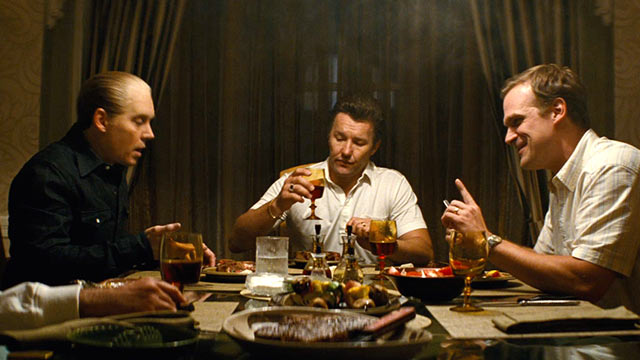“Black Mass” is essentially a
traditional rise and fall gangster drama within the aesthetic of the American
gothic experience. Director Scott Cooper tries to subvert the film’s familiar
trappings by setting in place a tension within the story where I we know the
two main characters are damned to failure from the first scene. Considering the clever set-up and the movie’s
all-star cast, the fact that the story almost broods to a complete stop by the
second act is as befuddling as it is a jaw-dropping disappointment.
Johnny Depp plays James “Whitey”
Bulger, the Boston crime-lord who inspired Jack Nicholson’s Frank Costello
character from Martin Scorsese’s 2006 Oscar-winning film “The Departed.” And
while Depp is every bit as unhinged and deranged here, the portrayal is
decidedly less animated. Joel Edgerton plays opposite as John Connolly, a shady
FBI agent who lets Bulger does as he pleases, so long as he
continues to sell out the Italian Mafioso that’s moving in to the Boston
streets. With his brother Billy Bulger (Benedict Cumberbatch) in a position of
local political power, Whitey is given a legal hall-pass by both the state and
federal authorities to become one of the most powerful and dangerous east-coast
gangsters of 70s and 80s. Nevertheless,
Bulger’s paranoia gets the best of him and both his criminal brethren and the
cooperating agents of the FBI are in constant fear of triggering his scorn.
Cooper’s vision of this story is
interested in investigating the interiority of the characters and exploring how
they click within their world of broken rules and the hypocrisy of their familial
street-code. This means on a genre-level things tend to skew more towards “The
Godfather” side of the gangster spectrum than it does “Goodfellas.” Given this
approach, there are far too many story and production choices that orient
things toward the broad surfaces. The all-star ensemble and the constant
walk-ons by known character-actors like Corey Stoll, Adam Scott, Rory Cochrane,
Peter Sarsgaard and Juno Temple spread the story too thin to effectively delve
into the tense relationship between Depp and Edgerton as the leads. With a
timeline that spans decades and multiple character perspectives to shift to and
from, the movie never becomes the deep character study it thinks it is.
Despite this structural flaw, Depp’s
performance is nuanced and appropriately pitched to the tone of the film, and
in many sequences he is quite engaging without defaulting to his usual
post-Pirates affections, but his Dracula-esq make-up design becomes so
distracting that it often blocks whatever subtly there is to appreciate in his
delivery. Off and on the rest of the
cast have their moments to shine and individual scenes of conversation work
well on their own when Cooper is afforded to do what he does best - zeroing in
on performance and dialogue. When it comes to the overall big-picture and the
execution of the screenplay, the movie unfortunately fails to drum up enough
drama to fuel the narrative.
Emotionally “Black Mass” doesn’t
work like it should, but the movie isn’t a total wash either. It was nice to
see Depp given something juicy to bite into as an actor and to play to his
actual age, but Cooper seems out of step with many elements of the film as a
director and often conflicts with the base genre elements of the story.
Grade: C-
Originally Published in the Idaho State Journal/Oct-2015
Originally Published in the Idaho State Journal/Oct-2015

No comments:
Post a Comment